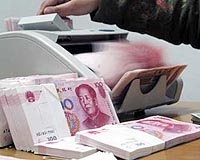| . |  |
. |
Washington (AFP) June 23, 2009 Accused of soft pedaling on trade issues with China, US President Barack Obama's administration has filed its first World Trade Organization complaint against the Asian giant. Together with the European Union, the United States launched the complaint Tuesday with the the global trade watchdog, accusing China of limiting raw material exports like bauxite and zinc, of which China is one of the world's largest producers, to give an unfair advantage to Chinese manufacturers. "Hopefully all of our partners will realize that we're serious about this," Obama's top trade envoy Ron Kirk asserted as he announced simultaneously with the EU Trade Commissioner Catherine Ashton about the WTO action on China. "All of us have parroted the words that we don't want to engage in anti-protectionism, but we have to give real meaning to that," Kirk told reporters in Washington. In raising the case, the United States said that by unfairly restricting exports of raw materials, China was hurting American steel, aluminum and chemical manufacturers, among other industries that desperately needed the materials. "We are most troubled that this appears to be a conscious policy to create unfair preferences for Chinese industries by making raw materials cheaper for China's companies to get, and goods more economical for them to produce," Kirk said. It is the first trade action against China under the administration of Obama, who was elected in November after campaigning for a robust trade policy against China, especially charges that it was manipulating its currency for trade gains. "Today's action sends a signal that America is beginning to get serious about enforcing the rules," said United Steelworkers (USW) President Leo Gerard. "But it's only the first step in what must be a comprehensive approach to get China to start playing by the rules," he said. The USW and four other steel industry organizations, whose workers and member companies represent all of America's steelmaking capacity, said removal of current "barriers" would improve the ability of US manufacturers to compete with Chinese producers on a "more level playing field." After a surprise attack on China over its currency policy in the early days after Obama became president in January, his administration was seen by some groups to have become soft with Beijing on trade issues. One reason cited was China's financial muscle. Being the top holder of US Treasury bonds valued at nearly 800 billion dollars, China is the largest creditor to the United States. Fred Bergsten, the head of the Peterson Institute for International Economics, said Obama needed to be bold on trade, citing as an example China's recent directive to local governments to favour domestic companies when purchasing goods under a massive stimulus package. "China's new protectionist policy on government procurement, while legal under the porous rules of the World Trade Organisation, sharply raises the threat to the global trading system that he must counter," Bergsten said. The United States has also been accused of giving preference to local products under its economic stimulus program. Since China joined the WTO about 10 years ago, the United States has filed half a dozen cases against the country, all of which under Obama's predecessor George W. Bush's watch. China has so far filed four cases against the United States. It launched the first WTO case against the Obama administration in April, challenging a US ban on Chinese poultry. China is the United States' third largest export market and is largest supplier of imports. The latest case against China came after talks the past two years failed to prod Beijing to remove the export restrictions on the raw materials. China said the restrictions were aimed at protecting the environment. "Taxing exports of some high energy-consuming and pollutant goods is to improve the world's trade environment and China's export structure, and to further enhance environmental protection measures," China's commerce ministry spokesman Yao Jian said last week. "There is no perfect trade policy." Under WTO procedures, the parties have up to 60 days to engage in consultations on how to resolve the dispute. At that point, the United States would be able to request formation of a dispute settlement panel to hear the dispute. Share This Article With Planet Earth
Related Links Global Trade News
 Siemens see big orders from China stimulus: state media
Siemens see big orders from China stimulus: state mediaBeijing (AFP) June 23, 2009 German industrial group Siemens expects to land orders worth 2.9 billion dollars over the next three years as part of China's economic stimulus plan, state media reported Tuesday. Half of the orders would focus on energy-efficient and environment-friendly technologies, the China Daily said, quoting the company's top official in China. "China's demand for environment-friendly technologies ... read more |
|
| The content herein, unless otherwise known to be public domain, are Copyright 1995-2009 - SpaceDaily. AFP and UPI Wire Stories are copyright Agence France-Presse and United Press International. ESA Portal Reports are copyright European Space Agency. All NASA sourced material is public domain. Additional copyrights may apply in whole or part to other bona fide parties. Advertising does not imply endorsement,agreement or approval of any opinions, statements or information provided by SpaceDaily on any Web page published or hosted by SpaceDaily. Privacy Statement |